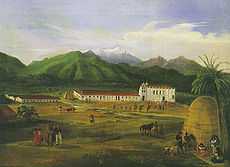Ferdinand Deppe

Ferdinand Deppe (1794–1861) was a German naturalist, explorer and painter. He was born and died in Berlin.
Deppe travelled to Mexico in 1824. He collected natural history specimens for the Berlin Museum with Count von Sack and William Bullock. He also collected in California and Hawaii on his way home in 1830. Some of his American flies were described by Christian Rudolph Wilhelm Wiedemann in Aussereuropäische Zweiflügelige Insekten published in Hamm (1828–1830).
In the field of herpetology, he is commemorated in the specific epithets of Abronia deppii (Deppe's arboreal alligator lizard), Aspidoscelis deppei (blackbelly racerunner), Pituophis deppei (Mexican pine snake), and Tantilla deppei (Deppe's centipede snake).[1] His name is also associated with Deppe's squirrel (Sciurus deppei ) [2] and Oxalis deppei, the so-called "lucky four-leaf clover".[3]
He was the younger brother of Wilhelm Deppe, an accountant with the zoological museum of Berlin.[4]
Associated publications
- "Travels in California in 1837"; (1953) Part of the series: Early California travels series, 15. Translated from a publication of 1847, Zeitschrift für Erdkunde, vol. 7, p. 383-90.[5]
References
- ↑ The Eponym Dictionary of Reptiles by Bo Beolens, Michael Watkins, Michael Grayson
- ↑ The Eponym Dictionary of Mammals by Bo Beolens, Michael Watkins, Michael Grayson
- ↑ Aberglaube : Wahrlich grüne Glücksbringer - Nachrichten @ Die Welt
- ↑ JSTOR Ferdinand Deppe's Travels in Mexico, 1824-1829
- ↑ OCLC WorldCat Travels in California in 1837
- ↑ "Author Query for 'Deppe'". International Plant Names Index.
- Erwin Stresemann: "Ferdinand Deepe's travels in Mexico, 1824-1829". In: The condor, an international journal of avian biology, 1954, pp. 86–92
|